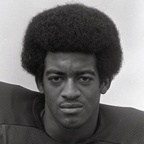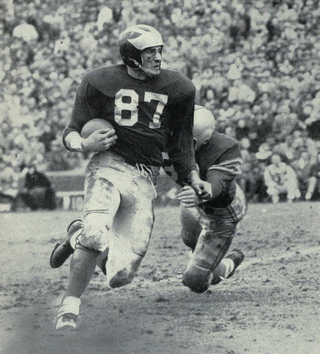Related Research Articles

David Steven Brown was an American professional football player who was a cornerback for 15 seasons in the National Football League (NFL) for the Pittsburgh Steelers (1975), Seattle Seahawks (1976–1986), and Green Bay Packers (1987–1989). He was selected as a second-team All-NFL player in 1984 and a second-team All-AFC player in 1985. His 62 career interceptions ranks tied for tenth in NFL history, with only five players having more interceptions in a career since his career ended in 1989. His 50 interceptions with the Seahawks remains a club record.

Ronald John Kramer was an American professional football player who was an end in the National Football League (NFL), primarily for the Green Bay Packers. A member of two NFL champion teams with the Packers, he was named to the NFL 50th Anniversary All-Time Team and Green Bay Packers Hall of Fame.
Arnold Timothy Massaquoi is a former American football tight end. He was selected by the Tampa Bay Buccaneers in the seventh round of the 2006 NFL draft. He played college football at Michigan. He is the cousin of former Cleveland Browns wide receiver Mohamed Massaquoi.
John Stuart "Jumbo" Elliott is an American former professional football player who was an offensive tackle for 14 years in the National Football League (NFL) with the New York Giants from 1988 to 1995 and the New York Jets from 1996 to 2000 and 2002. He appeared in 197 NFL games, including 156 as a starter. He was a key player on the 1990 New York Giants team that won Super Bowl XXV, received All-Madden honors in 1990 and 1991, and was selected to play in the 1993 Pro Bowl. His signature moment came in October 2000 when he caught the game-tying touchdown pass in the game known as the "Monday Night Miracle".

Reginald McKenzie is an American former professional football player who was a left guard in the National Football League (NFL), primarily for the Buffalo Bills from 1972 to 1982. Selected as a first-team All-NFL player in 1973 and second team in 1974, McKenzie was a key player on the Bills' offensive line that became known as the Electric Company that led the way for O. J. Simpson to become the NFL's first 2,000-yard rusher during the 1973 NFL season.

James Michael Mandich, also known as "Mad Dog", was an American professional football player who was a tight end in the National Football League (NFL). Mandich played college football for the Michigan Wolverines from 1967 to 1969 and was recognized as a consensus first-team tight end on the 1969 College Football All-America Team. A second-round pick in the 1970 NFL Draft, he played in the NFL for the Miami Dolphins (1970-1977) and Pittsburgh Steelers (1978). After his playing career ended, he worked as the color commentator for the Miami Dolphins and also hosted a sports talk show on local AM radio in Miami.
James Arthur Smith is an American former professional football player who was wide receiver in the National Football League (NFL). He played college football for the Michigan Wolverines from 1974 to 1976. He played in the NFL for six seasons with the Pittsburgh Steelers from 1977 to 1982 before starring on the Birmingham Stallions of the rival United States Football League (USFL). After the USFL's demise, Smith played a final season for the Los Angeles Raiders in 1985.
John Joseph Greene was an American collegiate wrestler and football player.
Craig Carter Dunaway is a former American football player. He played college football as a tight end for the University of Michigan from 1980 to 1982. In three years with Michigan, Dunaway caught 55 passes for 775 yards and eight touchdowns. He played professional football for the Pittsburgh Steelers in 1983. He appeared in 11 games, none as a starter, for the Steelers.

Kevin Jamaal Koger is an American football coach and former college tight end who is currently the tight ends coach for the Atlanta Falcons of the National Football League (NFL). He was a 2011 All-Big Ten honorable mention. In 2012, Koger began working as a coach in Saline, Michigan. Just before signing day in February 2015, Koger joined Butch Jones’s staff at the University of Tennessee as a graduate assistant.

The 1969 Michigan Wolverines football team was an American football team that represented the University of Michigan in the 1969 Big Ten Conference football season. In their first year under head coach Bo Schembechler, the Wolverines compiled an 8–3 record, played in the 1970 Rose Bowl, and finished the season ranked No. 9 in the final AP poll and No. 8 in the final UPI poll.

The 1981 Michigan Wolverines football team was an American football team that represented the University of Michigan in the 1981 Big Ten Conference football season. In their 13th season under head coach Bo Schembechler, the Wolverines compiled a 9–3 record and outscored all opponents by a total of 355 to 162. Ranked No. 1 by both the AP and UPI in the preseason polls, Michigan lost to Wisconsin in its season opener, then defeated No. 1 Notre Dame the following week, and ended its season with a victory over UCLA in the Astro-Bluebonnet Bowl. The Wolverines were ranked No. 10 in the final UPI poll and No. 12 in the AP Poll.

The 1974 Michigan Wolverines football team was an American football team that represented the University of Michigan in the 1974 Big Ten Conference football season. In their sixth year under head coach Bo Schembechler, the Wolverines compiled a 10–1 record, outscored opponents 324 to 75, and were ranked #3 in final AP Poll. Michigan won the first ten games of the 1974 season in convincing fashion, including blowout victories over Colorado (31-0), Navy (52-0), Minnesota (49-0), and Purdue (51-0). In the final game of the season, #2 Michigan faced #3 Ohio State. The Wolverines lost by a score of 12-10, as place-kicker Mike Lantry missed a last-minute field goal that would have given Michigan a victory.

The 1973 Michigan Wolverines football team represented the University of Michigan in the 1973 Big Ten Conference football season. In his fifth year as Michigan's head coach, Bo Schembechler led the team to a 10–0–1 record. It was Michigan's first undefeated season since 1948. The Wolverines outscored their opponents 330 to 68. Michigan was ranked No. 6 in both of the major post-season polls. Two other selectors, the National Championship Foundation and the Poling System, recognize Michigan as a co-national champion for the 1973 season.

The 1972 Michigan Wolverines football team was an American football team that represented the University of Michigan in the 1972 Big Ten Conference football season. In their fourth season under head coach Bo Schembechler, the Wolverines compiled a 10–1 record, outscored opponents 264–57, and were ranked sixth in both final polls. Offensive guard Tom Coyle and defensive back Randy Logan were the team captains.

The 1970 Michigan Wolverines football team was an American football team that represented the University of Michigan in the 1970 Big Ten Conference football season. In their second season under head coach Bo Schembechler, the Wolverines compiled a 9–1 record, tied for second place in the conference, and outscored opponents by a total of 288 to 90. Michigan's victories included intersectional contests with Arizona (20–9), Washington (17–3), and Texas A&M (14–10). The team won its first nine games before losing to rival Ohio State and was ranked No. 7 in the final UPI Poll and No. 9 in the final AP Poll

The 1968 Michigan Wolverines football team represented the University of Michigan in the 1968 Big Ten Conference football season. In their tenth and final season under head coach Bump Elliott, the Wolverines compiled an 8–2 record, outscored opponents 277 to 155, and finished the season in second place in the Big Ten Conference and ranked No. 12 in the final AP Poll. After losing the season opener to California, the Wolverines won their next eight games by a combined score of 256 to 84. The team rose to No. 4 in the AP poll before losing to Ohio State by a 50–14 score in the final game of the season.
The 2010 East–West Shrine Game was the 85th staging of the all-star college football exhibition game featuring NCAA Division I Football Bowl Subdivision players. The game featured over 100 players from the 2009 college football season, and prospects for the 2010 Draft of the professional National Football League (NFL), as well as for the United Football League's inaugural draft. In the week prior to the game, scouts from all 32 NFL teams attended. The proceeds from the East-West Shrine Game benefit Shriners Hospitals for Children.

Jonathan Duane "Jake" Butt is an American former professional football player who was a tight end for the Denver Broncos of the National Football League (NFL). He played college football at the University of Michigan. He was selected as a two-time All-American and was a two-time Big Ten Tight End of the Year. Also winning the Ozzie Newsome Award, John Mackey Award and the Senior CLASS Award. He was selected by the Denver Broncos in the fifth round of the 2017 NFL draft.

Luke Schoonmaker is an American football tight end for the Dallas Cowboys of the National Football League (NFL). He played college football at the University of Michigan and was selected by the Cowboys in the second round of the 2023 NFL draft.
References
- 1 2 3 4 5 6 "Paul Seymour". Pro-Football-Reference.com. Sports Reference LLC. Retrieved March 27, 2015.
- 1 2 3 4 "All-Time Football Roster Database". University of Michigan, Bentley Historical Library. Retrieved March 26, 2015.
- ↑ "Shrine Knight Hall of Fame". Shrine Knight Alumni. Archived from the original on April 2, 2015. Retrieved March 27, 2015.
- ↑ "Michigan Football Statistic Archive Query Page". University of Michigan. Archived from the original on September 7, 2004. Retrieved March 27, 2015.
- ↑ "2014 NCAA Football Records: Consensus All-America Selections" (PDF). National Collegiate Athletic Association (NCAA). 2014. p. 6. Retrieved February 10, 2015.
- ↑ "ESPN College Football Encyclopedia: The Complete History of College Football from 1869 to the Present". Archived from the original on November 12, 2008. Retrieved March 21, 2009.
- 1 2 "Bills' Seymour 'Redeems' Himself". The Ledger, Lakeland, Florida (AP story). October 21, 1974. p. 4B.
- ↑ Sheeley, Glenn (August 24, 1978). "Fails Physical Exam: Steelers Return Seymour". Pittsburgh Press. p. D-1. Retrieved March 27, 2015.